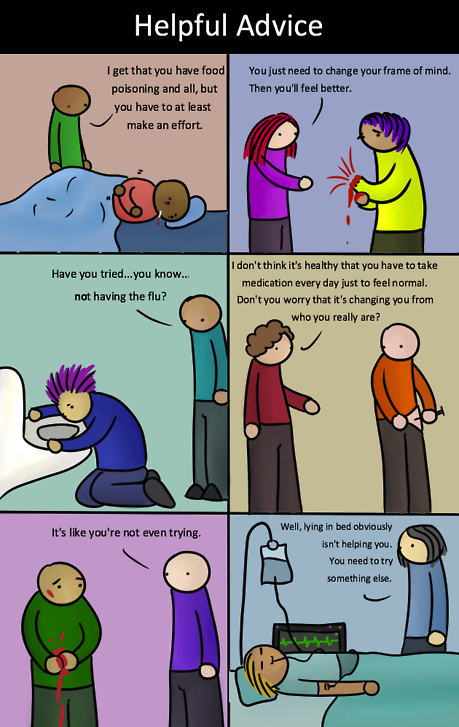If You Know Someone With Depression, Embrace This Comic

By:
Nearly 20 percent of America's adult population suffers from mental illness, yet many people still don't understand how it works. Some tell victims to just "snap out of it" or that it's "all in your head," but Robot Hugs' comic below illustrates the absurdity of this kind of advice by imagining a world in which we treat physical illnesses like we treat mental illnesses.
 Robot Hugs - robot-hugs.com
Robot Hugs - robot-hugs.com
Singer Demi Lovato, who suffers from bipolar disorder, recently met with legislators in Washington, D.C., to spread awareness on mental health issues. She told People magazine in a new interview that it's important to start viewing mental illness the same way we view physical illness.
"I think it's important that people no longer look at mental illness as something taboo to talk about," she said. "It's something that's extremely common, one in five adults has a mental illness, so basically everyone is essentially connected to this problem and this epidemic. The problem with mental illness is people don't look at it as a physical illness. When you think about it, the brain is actually the most complex organ in your body. We need to treat it like a physical illness and take it seriously."
Don't ask people why they have depression.
Comedian Stephen Fry has spoken before on the problem with prodding people about "why" they have depression, saying that's the wrong thing to ask.
"If you know someone who's depressed please resolve to never ask them why," Fry said. "Depression isn't a straightforward response to a bad situation, depression just is, like the weather. Try to understand the blackness, lethargy, hopelessness, and loneliness they're going through. Be there for them when they come through the other side. It's hard to be a friend to someone who's depressed, but it is one of the kindest, noblest and best things you will ever do."
Like Lovato, Fry is also a victim of bipolar disorder. He reportedly attempted suicide more than once in his life. After his most recent attempt two years ago, he explained the ridiculousness of asking someone "why" they're unhappy.
"There is no 'why,' it's not the right question," he said. "There's no reason. If there were a reason for it, you could reason someone out of it, and you could tell them why they shouldn't take their own life."
If you or someone you know is experiencing suicidal thoughts, reach out to the National Suicide Prevention Lifeline. You can also check out the National Alliance on Mental Illness (NAMI) website for Mental Health Awareness Week.
